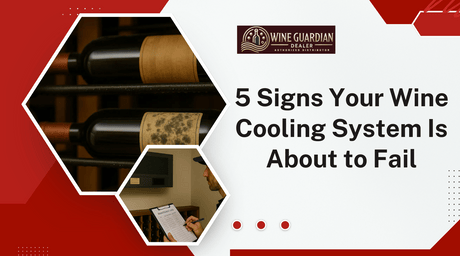
5 Signs Your Wine Cooling System Is About to Fail
Don’t wait for a costly surprise. Wine Guardian Dealer breaks down the top 5 signs your wine cooling system may be failing — and how to fix it before damage...
Jim Hopper
In Stock & Ready to Ship – Order Your Wine Cooling System Today!
Free Wine Cellar Expert Consultation | 📞 Call 1-800-260-1712
Start with a free expert consult—cooling system sizing, racking options, and no upsells.

Build your dream wine cellar—without costly mistakes or guesswork.
By Jim Hopper, Wine Cooling Expert

Maintaining the right relative humidity level in your wine storage space or wine room is crucial for preserving your wine collection. Whether you’re a seasoned wine collector or new to wine storage, understanding wine cellar humidity control ensures your wine remains in peak condition. This guide will explore the best humidity for wine storage, how to regulate humidity in a wine cellar, and the most effective wine cooling unit with humidity control to maintain an ideal environment for your wines.
For full guidance on climate control, wine aging timelines, and long-term storage best practices, check out our complete Wine Aging and Preservation: Protecting Your Collection for the Next 30 Years.
Wine cellar humidity refers to the moisture content in the air of a wine storage environment. The ideal humidity for wine storage should be between 55% and 75% to keep corks moist, prevent oxidation, and preserve the integrity of your wine bottles. Excess moisture can lead to the proliferation of fungi and mould in corks, contaminating the wine. Humidity must also be maintained at a constant level between 60% and 70% to ensure optimal conditions. Additionally, the ideal wine storage temperature is typically between 45-65°F (7-18°C), which complements proper humidity levels for wine preservation.
Wine is a pristine and vivacious cultural tradition that has been sensitive to its environment and needs careful treatment. Wine must be stored in the optimal cellar to protect and age the wine without affecting the wine, maintaining both optimal temperature and humidity control. To preserve its quality, wine should be stored in dark conditions most of the time. Proper conditions ensure that wine ages properly, with factors like temperature, humidity, and ventilation playing crucial roles in maintaining the integrity of the wine as it matures. You should never store food or smelly products in or near a wine cellar to prevent humidity issues.

The relationship between temperature and humidity in a wine cellar is critical. Maintaining the optimal temperature is crucial to ensure proper aging and protect wine collections from fluctuations. Fluctuations in temperature can cause changes in humidity, which impacts the aging process of fine wine and vintage wines. Split cooling systems operate in two parts, with the evaporator unit inside the cellar and the condensing unit outside. The ideal wine storage temperature for a wine cellar is 12°C, ensuring wines age gracefully. Wine cellar cooling systems typically operate at temperatures between 45° and 65° F, providing the necessary range for optimal wine preservation.
A wine cooler can help manage temperature and humidity effectively, ensuring that wine collections remain in pristine condition. Wine cellar cooling systems are specialized air conditioners designed for wine cellars.


Ensuring the best humidity for wine storage requires high-quality wine cellar cooling systems. At Wine Guardian Dealer, we provide top-tier wine cooling and humidity control units to maintain an ideal environment for your collection.
Whether you need a self-contained unit, ducted cooling system, or an integrated humidification solution, Wine Guardian Dealer has the perfect system for your wine collection.
🔹 Shop our collection today and experience precision climate control for your wine cellar!
To ensure the ideal humidity for wine storage, follow these essential tips:
By following this guide, you can keep your wine collection in peak condition. Explore top-rated wine cooling units with humidity control to safeguard your investment today!
“My wine room always hovered around 40% humidity. Bottles were drying out. I added a Wine Guardian humidifier last year—and haven’t had an issue since.”
— Elliot R., Chicago
“We built a wine cellar in the attic and didn’t realize how dry it got up there. Wine Guardian’s ducted system with humidity control was the only thing that fixed it.”
— Sandra M., Scottsdale
Humidity issues can quietly ruin even the best collection. But with the right monitoring tools and Wine Guardian equipment, you can keep your wine safe, stable, and perfectly aged.
👉 Shop Wine Guardian Cooling & Humidification Systems
We offer complete solutions for temperature and humidity control.
📞 Call 1 (800) 260-1712 for a FREE wine cellar consultation
Our team will help you find the best setup for your home, collection size, and environment.
Yes! Temperature and humidity are both essential. One without the other puts your wine at risk.
No. Home humidifiers aren’t designed for the consistent, controlled output wine needs—and many over-humidify.
Watch for shrinking corks, loose seals, or dry air. A digital hygrometer is your best friend here.
If your space runs dry often, yes. Wine Guardian Humidifiers are designed to pair perfectly with their cooling systems for full climate control.
Yes. Many Wine Guardian units help regulate humidity, especially ducted and split systems.
🛒Shop our most-loved Wine Guardian cooling systems today.
🛠️Protect your wine with the most trusted systems on the market.
❤️Tested, reviewed, and loved by serious collectors like you.